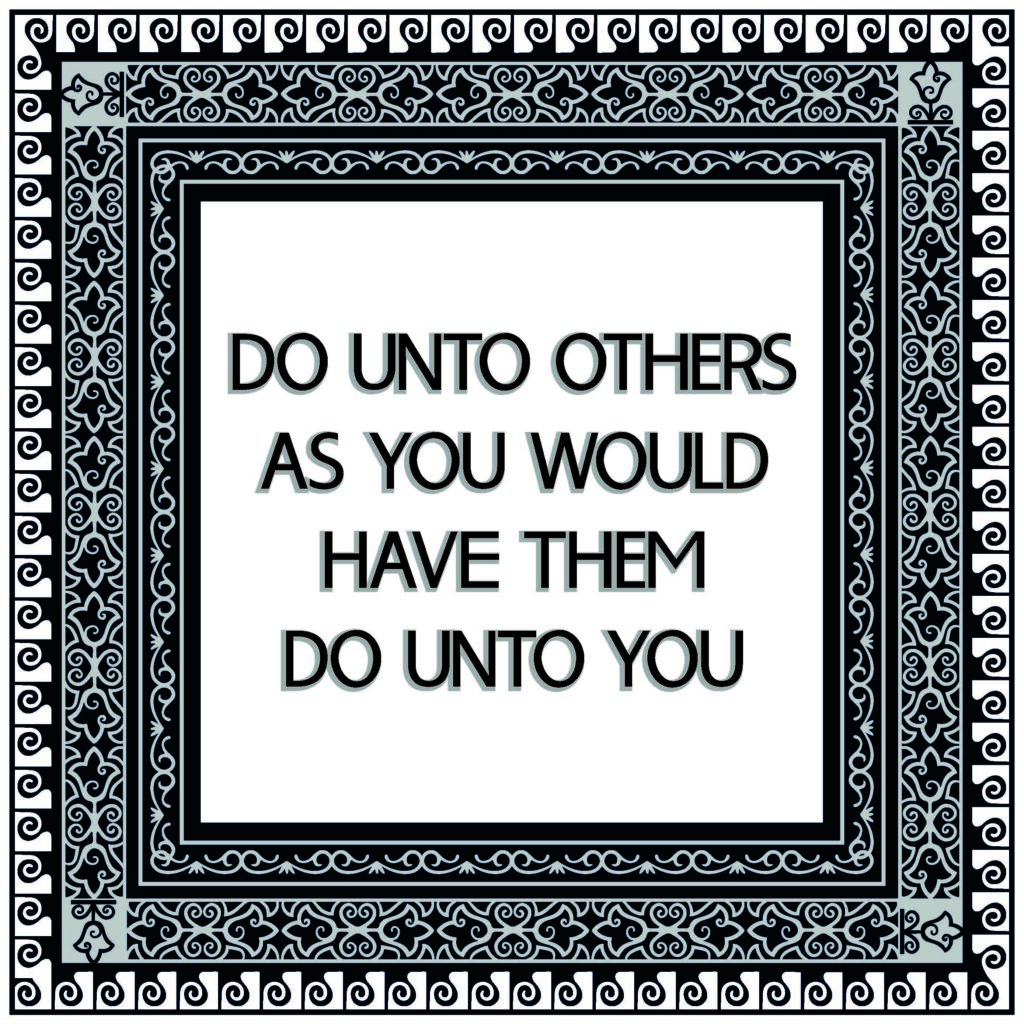
Climate change is upon us
The Golden Rule, “Do unto others as you would have them do unto you”, may be the most important teaching of all religions and philosophies regarding human relationships. I think it is a good doorway through which to enter a meditation that centers on human relationships and the place of love in this world.
What can I do about climate change?
Passing through that door, I recently discovered a surprise idea: renouncement.
It all started with breathing in the smoke and thought about climate change. This is my meditation.
As I write this, I am in Chicago, breathing in the smoke from Canadian wildfires. I feel a slight tightness in my chest which I probably wouldn’t have noticed if not for the hazy skies and the news reports. What we call “smoke” are airborne particles from trees and other brush that have caught fire. These particles have blown thousands of miles to enter my body. Of course, the molecules of air that I breathe in each day have also travelled thousands of miles, probably millions of times over, before entering my body. It is just that, until now, I have not been aware of this.
The wildfires and smoke are just the latest reminder that the earth is a small planet, and we are all connected. Our increasingly manmade human world dominates everyday experience. It seems to determine more and more of how we live, not only weather, but… everything. While I love science and appreciate scientific development, I think we have to admit, we have been like children playing with fire.
We didn’t realize that we had this much power and now with the advent of artificial intelligence, we may be heading further and further away from the natural world.
What about individualism and climate change?
My son works full time, sometimes, it seems, with desperation to decrease carbon emissions and global warming by trying to get individual states in the Midwest to create laws and programs to support clean energy and equitable jobs. While individual efforts are good, efforts on a large scale can only lead to the effects needed to have long range benefits. In many countries but especially here in the USA, individualism reigns supreme. This is just one of the many obstacles that prevent doing anything about climate change on a large scale.
Everyone thinks first, “how is this going to affect me?” Since consumption is the basis of our economy, it is hard to see how we can avoid a double message – consume as much as you can and, cut back.
It can make you crazy. It is hard to give up something you could have, especially if it is being touted as something you need.
What is enough?
Another word for “giving up something you could have” is to “renounce”. I have come to think over the years that our loss of this ability is the source of much imbalance in the world. We value “progress”. Progress is often equated with “more”. The feeling of not having or being “enough” is baked into our culture. It is an especially good motivator for sales too.
While we can see how vested interests want this to continue, I benefit too from a thriving economy. I want to keep it going and expand the number of people who can benefit from it. Amazon is the perfect institution these days. If I have a material desire, with a single click of my Amazone Prime link, that desire can be fulfilled. I am not alone. I see the Amazon trucks are on my street more and more. Warehouses are being built nearby so I don’t have to wait too long for the merchandise to appear after the press of my finger.
Can we learn to pass on something we could have?
Is it possible to renounce?
Can we learn to give up something we could have for the good of all?
Considering the needs of all
This is a question all of us in the WEIRD (western, educated, industrialized, rich and democratic) world face.
Unless we can learn to renounce, none of our good intentions about climate change can be realized. If we learn to renounce, we will be able to realize more than we can imagine, many of the things that we need to do to deal with the macro problems of humanity.
Renouncement of this sort is an old idea that we mostly associate with monastic life. However, it is often an unacknowledged inner movement that is part of some of the many other diverse things like love, sacrifice, forgiveness, creativity, simplicity that we value. If you look for it, you will find it in daily life.

The Golden Rule and Renouncement
I was particularly struck recently when renouncement came up in a discussion of The Golden Rule.
I was talking to my friend Ed about “The Golden Rule”. Its most common form is “Do unto others as you would have them do unto you.” With slightly different wordings it may be the most important teaching in all religions dealing with human relationships.
Ed is a psychologist and international consultant for social emotional intelligence. He has helped put together programs for many schools and corporations across the world. He has consulted with the US Army and has an special interest in psychology and humor. I asked him whether the Golden Rule was still important these days. He confessed to a belief that if it was taken seriously, he might be out of business.
He added, “The Golden Rule” has been taking a beating these days.”
The Golden Rule was baked into my psyche as a small child. My parents were not very religious, but my mother was very big on applying The Golden Rule to many interpersonal issues. This especially included my not always stellar treatment of my younger sisters. As I got older and leaned more about religions, I learned about the different beliefs espoused by each. I seemed to have had an inborn skepticism about unprovable beliefs. It was reinforced by my lifelong study of science. The seeming unending conflicts between people based on religion did not seem to square with the “Golden Rule” that each religion thought was so important.
This discrepancy is something I have long contemplated.

THE GOLDEN RULE AND EMPATHY
In this meditation, I started with the question, “what does it take for a person, let alone a religion or a nation, to put The Golden Rule into actual practice?” I began to go from the simple surface words into the deeper challenges that “Do unto others as you would have them do unto you” brings forth. The first thing that seems obvious is the need for empathy to realize the Golden Rule,
I begin with the observation that my default state of awareness is self-centeredness. I see things through my perspective. Through meditation exercises and the efforts to apply those insights in daily life, I have learned how limited is that perspective. I have also learned that with a little awareness and some effort, I can overcome it.
A meditation exercise that I have often done involves imagining deeply another person’s experience. For example, I have tried to imagine myself as a member of a different religion, a different racial group, a different gender. You might call these exercises of empathy, though a cynic, might call them exercises of psychological projection. However, if you realize that you cannot really “walk a mile in someone else’s shoes”, the poor meditation exercises show me my own projections, my own prejudices and about others: how I think that they think is sometimes the heart of what needs to be overcome.
Self-centeredness
In my self-centered state, my desires, my points of view are of foremost importance. Questions that are raised within me are:
Is there room in my heart to take another’s interests into account when I need to make a choice?
Can this help in our approach to solving climate change?
How much importance do I give as to how I affect others?
Do I see myself in isolation or as part of a group, where each of us affect each other?
Can I truly empathize with others who are very different than me? Am I truly curious and interested about others? What are my unconscious prejudices and entitlements?
The tragic history of humanity especially includes dehumanizing the “other”. It is what is needed in order to kill another in war and genocide. It helps a lot to see a person as so different from me that they don’t feel pain and suffering as I do. Seeing ourselves as separate helped perpetuate slavery, and today it fuels racism, the gender wars and religious prejudice.
Dehumanizing the Other
Can I renounce my tendency to categorize others and dismiss them based on those categories? Can I see the humanity in each person? In a world that is every day “smaller”, where we are likely to encounter people of different appearance, beliefs, and habits than us, this is not a trivial question.
Indeed, our survival as a species may depend on this.
A real test of this renouncement occurs when I feel wronged. While I may feel sad or hurt at first, this can easily morph into anger. And anger can move quickly and long lastingly into aggression and revenge. While I may not act upon these feelings, through meditation exercises, I have seen how these thoughts arise, linger and where they go.
I want to avenge. I feel good about this feeling. It is the underlying story line in most action films. They are watched by millions every day and a kind of unconscious programming of how to react is taught.
This discussion makes me uncomfortable because my hurt is real. It is easy to see that the ability to renounce my desire for revenge is challenging!
Of course, justice needs to be served when it can. However, my self-centeredness always tips the scales towards me!

Social Media and the Golden Rule
Ed thinks that The Golden Rule is threatened by our increasing reliance on the internet, especially social media. He gave the example of online hate speech and bullying that is so prevalent. He says that it is more difficult to dehumanize a person who is right in front of me than to dehumanize someone that you know only through your computer. They are not as real to me as the person in front of me and thus, you have less empathy for them. Combine this with “mob” psychology, where my individual conscience is overwhelmed by a group with whom I identify. This now helps large groups to easily organize to attack others all over the world.
Can I renounce this insidious programming of my mind by others who have a stake in creating more conflict? Can I think and act on my own, defying the “mob” psychology based on anger and hate. Not always so easy when the costs of that defiance are added up.
THE UNKNOWN, RENOUNCEMENT AND WONDER
If “renounce” can simply be seen as letting go of something I could have, then it is easy to see how it applies with respect to living out The Golden Rule. It is a movement that is counter to the movement of obtaining everything I might desire. In Tibetan Buddhism, the world we live in is called the world of desire. You don’t have to be a Buddhist to understand this.
Can I make “Enough” a real value? Can it help climate change?
When I get out of my self-centeredness, I encounter unknowns and if I can become comfortable with the unknown, I am able to see less anxiously and less defensively. So I meditate on the Unknown and I come to realize that the “known” world is infinitely smaller than the unknown. It is out of contact with this, I open to the unknown and that leads to interest and curiosity outside my “comfort zone”. I learn to renounce, to the degree that I can, the fear and its attendant defensiveness.

Wonder and beauty that has been all around me goes unnoticed. I realize the amazingness of common, overlooked things – like the trees around me – the amazing artistic expression in music that I have only half heard.
“Seeing the universe in a grain of sand” is possible anytime.
Walking upright on this planet, feeling the light of the sun, I walk down my block. I realize that my “aloneness” is more a feeling than a reality.
The reality is that I am a transient part of all of this for all time.
About the Author(s)
Bob Magrisso is a physician and long-time meditator. He tries to practice “applied spirituality”.





